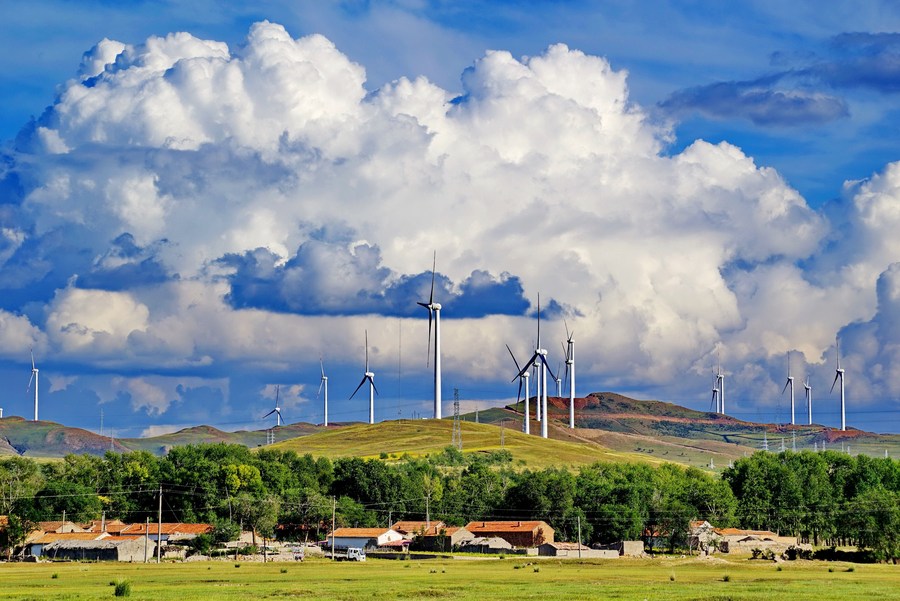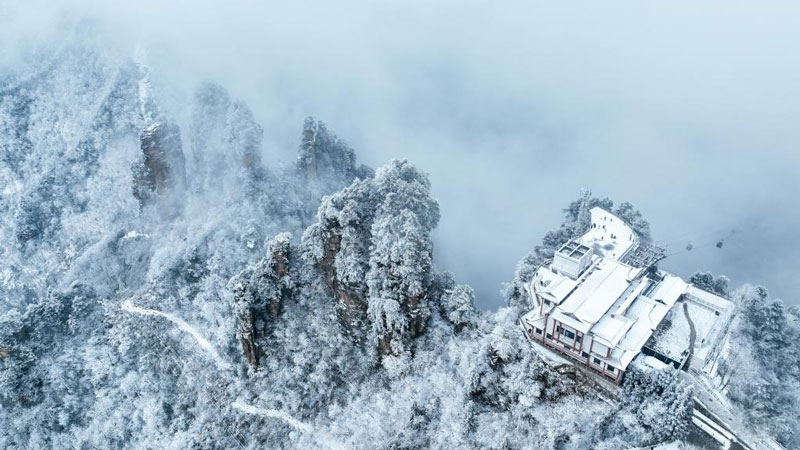Environment gets new focus in advisory body

A file photo shows a wind power plant in Zhangjiakou, North China's Hebei province. [Photo/Xinhua]
China's top political advisory body has set up a new group focusing on the environment and natural resources, a move that an expert said reflected the inclusive, extensive and diverse characteristics of this major national body.
The new group has 85 members, making it the ninth-largest of the 34 participating groups in a list issued on Wednesday of members of the 14th National Committee of the Chinese People's Political Consultative Conference, which will open its first session in Beijing on March 4 at which a new chairman of the CPPCC National Committee will be elected.
The list was approved at a session of the Standing Committee of the 13th CPPCC National Committee, which concluded on Tuesday.
The newly launched group focusing on the environment and natural resources includes Party and government officials, including Huang Runqiu, the minister of ecology and environment, as well as experts and scholars in the field.
Shi Taifeng, a member of the Political Bureau of the Communist Party of China Central Committee and head of the United Front Work Department of the CPC Central Committee, said that the membership of the 14th CPPCC National Committee meets the organization's requirements as "the most extensive patriotic united front organization and an important channel for consultative democracy in the new era".
Speaking on Monday at the meeting of the Standing Committee of the 13th CPPCC National Committee, he said that the membership list is "widely representative" and basically covers people who need to participate in the CPPCC in all fields and aspects.
During the annual sessions of provincial-level political advisory bodies earlier this month, many provincial CPPCC committees also launched their own new sector focusing on the environment and natural resources.
The CPPCC National Committee is reshuffled every five years. Its membership includes representatives from the CPC, non-Communist parties, mass organizations, ethnic minority groups and various sectors of society.
Wang Xiaohong, director of the department of united front theory at the Central Institute of Socialism, said: "Establishing the new sector reflects China's emphasis on ecological progress and environmental resources. The new sector can give full play to the experts' collective wisdom and strength to make more suggestions for high-quality development."
"The changes also reflected the inclusive, extensive and diverse characteristics of the advisory body," Wang added.
As mapped out at the 20th CPC National Congress, harmony between humans and the nature is one of the features of Chinese modernization.
Zhang Xingying, deputy head of the science &technology and climate change department under the China Meteorological Administration, who is a member of the newly launched group, said the environment and resources are a major foundation of sustainable development.
"Properly handling the relationship between the environment and resources is important for high-quality development," he said. "It's also a question China has to answer on the path of modernization."
Zhang was also a member of 13th CPPCC National Committee, during which he served in the agricultural sector. Previously, political advisers such as Zhang who were engaged in the field of the environment and resources were scattered among various different participating groups.
With this new group dedicated to their specialized field, he said it would help them to conduct more systematic and scientific research, and better assist the authorities in promoting ecological progress, conserving resources and realizing a green environment.
"As it gathers experts from different industries, I will be able to hear more scientific voices and suggestions, as well as information, so as to help me better perform my duties," he added.
As an important organ for multiparty cooperation and political consultation under the leadership of the Party, CPPCC members serve as advisers for government, legislative and judicial organs and put forward proposals on major political and social issues.
Among the 2,172 members of the new CPPCC National Committee, 852 are from the CPC, accounting for 39.2 percent of the total, while non-CPC members account for 60.8 percent.
The average age of the members is 56.6, and 2,037 of them hold college degrees or above, and 125 are academicians of the Chinese Academy of Sciences and the Chinese Academy of Engineering.
Looking back in history, Wang said the CPPCC had adjusted its groups in line with the changes in the major tasks of the CPC and the State in order to make a more significant contribution.
During the Seventh CPPCC National Committee, the China Association for Science and Technology, an organization of Chinese scientists and engineers, was added as a constituent group in 1988 after late Chinese leader Deng Xiaoping said, during a meeting on Sept 5 1988 with then-Czechoslovak President Gustav Husak, that "science and technology are primary productive forces".
During the Eighth CPPCC National Committee, an economic group was set up as the country further emphasized economic development. Also, since Hong Kong returned to the motherland in 1997, the group composing Hong Kong and Macao compatriots were divided into two sectors, she said.
From that time to the 14th committee, there was no adjustment to the groups but name changes, Wang said, for example, when China established its social security system, the name of the social welfare group was expanded to include social security.
Photos
Related Stories
- Guardians of the 'kidneys of earth' write stories of harmonious coexistence between man and nature
- China continues to tackle noise pollution in 2021-2025
- Draft rules aim to conserve ecosystems
- China's ecological environment improved greatly over past decade: CAS
- Symposium lauds Xi's thought on environment
- Ecological environment of protected areas witnesses improvement in Ruoergai County, SW China
Copyright © 2023 People's Daily Online. All Rights Reserved.









